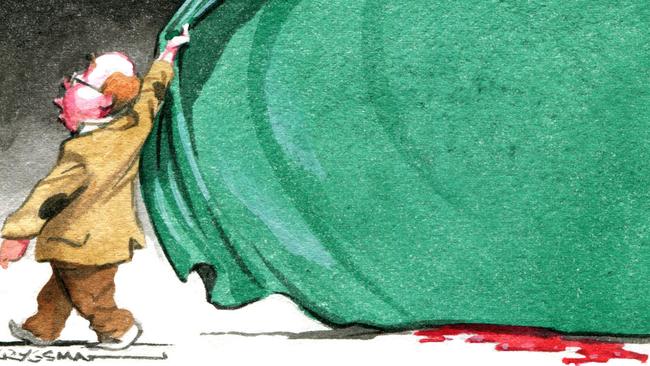
IF, heaven forbid, a demented jihadist manages to get under ASIO’s guard and maims or kills some fellow citizens we’ve only got ourselves to blame.
Those, at least, are Uthman Badar’s thoughts on the matter, as published last week in The Australian: “If an attack does occur on Australian soil … government policy of the last decade will be responsible for its persistent aggression and imposition on the Muslim world and persistent unjust targeting of Muslims locally.”
The conception of the terrorist as victim rather than oppressor is an intellectual contrivance we’ve heard before. Badar, however, adds a new twist by adopting the sentimental arguments of diversity to justify grievance.
The scrutiny of suspected jihadists is not a commonsense precaution but the “persistent and unjust targeting” of a minority, and therefore politically incorrect.
There is a disquieting irony in the use of the language of anti-discrimination to vindicate a death cult. Multiculturalism holds little sway in the caliphate, as best we can tell, and the “persistent and unjust targeting” of Christians, Kurds, journalists and aid workers is merciless. Yet these sardonic details are lost on the bien pensants, who insist that it is our beastliness towards a peace-loving people that prompts them to strap on explosives, walk into their local market and blow themselves up.
“I think we need to find better words than ‘terrorist’ and ‘terrorism’,” the Greens’ Peter Whish-Wilson told the Senate a fortnight ago. “Our forces could be seen by Iraqi civilians as being terrorists … We use that word because it is a very simple word to use and it demonises people.”
Sadly, the mushy logic behind this statement is more common than we would like to think. There are whole academic departments devoted to enforcing the orthodoxy of “critical terrorism”, which holds that “terrorism” (a word always lodged between scare quotes) is a mere abstraction. It is a signifier employed in hegemonic discourse designed to frighten the populace into an illegitimate war.
This intellectual sludge would be of little consequence if our universities could be sealed to prevent the residue leaking. Yet critical theory passes for serious political analysis. Nothing a prime minister says can be taken at face value any more. Words and actions must be “interrogated” to discover their deeper purpose. In the language of critical theory, security alerts are “performative utterances” that demand to be deconstructed.
So when the government raised the threat level to high, it cannot simply be reacting to advice from intelligence agencies. Like the US president in the movie Wag the Dog, who fabricates a war to divert attention from a scandal, Tony Abbott probably is making up the whole thing.
Labor senator Sue Lines told Fairfax Media last month the Prime Minister “is just using this as a shield to try and deflect from the awful mess they’re in with their budget”. The “scaremongering”, as Lines called it, was the work of a government “dead keen to get out there and try and improve its ratings”.
Labor’s Kim Carr added, “they want to talk about everything but their own fiascos when it comes to this budget.”
The self-loathing arguments of moral equivalence, which fail to draw a distinction between those who carry out atrocities and those who want to stop them, passes almost unnoticed. On Friday West Australian Labor MP Alannah MacTiernan tweeted: “The jihadi threat is real but many Australians also see Abbott as a terror as he takes a wrecking ball to our social infrastructure.”
Whish-Wilson gets caught up in semantics. “We have been hearing a lot about ‘evil’, ‘unspeakable evil’, ‘unfathomable evil’ and ‘pure evil’, he said. “While it might be the case that in many people’s minds the atrocious and despicable acts we have seen on social media are evil, that evil did not just spring out of the ground.”
Indeed not. The crazy utopian ideology, powered by grievance and revenge, must have flourished somewhere, as the University of Queensland’s David Martin Jones and MLR Smith from King’s College London discuss in their recent book, Sacred Violence: Political Religion in a Secular Age. They have little time for the metaphysics of critical theory. Instead they study terrorism empirically.
Jones and Smith conclude that Islamism is best understood not as a form of religious extremism but as an ideology, or more precisely a “political religion”, closely akin to the illiberal totalitarian movements of the 20th century. Islamism has more in common with Nazism, a political religion if ever there were one, than it does with traditional religious faith.
Jones and Smith challenge other preconceptions, like the idea that Islamism is brought back to Australia by vulnerable young people radicalised abroad. In fact, the quasi-intellectual arguments of groups like Hizb ut-Tahrir were created in Western universities. Academe, the commentariat and the media facilitated this ideological and strategic evolution.
It was in the affluent societies in the West, rather than the slums of Gaza or Karachi, that adherents of the political religion found the freedom and resources to spread the notion of an “illiberal cybercaliphate”.
“It was from London, with its global links, that it could promote its agenda internationally and, until recently, without fear of surveillance or prosecution, establishing branches in Sweden and The Netherlands as well as the UK,” write Jones and Smith.
It is clear that liberal democracies made a catastrophic mistake by trying to appease these ideological cranks with the manners of multiculturalism. They were distracted from their purpose by the fear of marginalising, demonising or otherwise contravening the rights of minorities.
The Islamists have been happy to play that little game, adopting the guise of the meek and dispossessed, caught at the wrong end of an imbalance of power.
The civilised, educated, technological, advanced modern state, which we trusted for our protection, has proved no match for the suicide bomber.
Nick Cater is executive director of the Menzies Research Centre.


